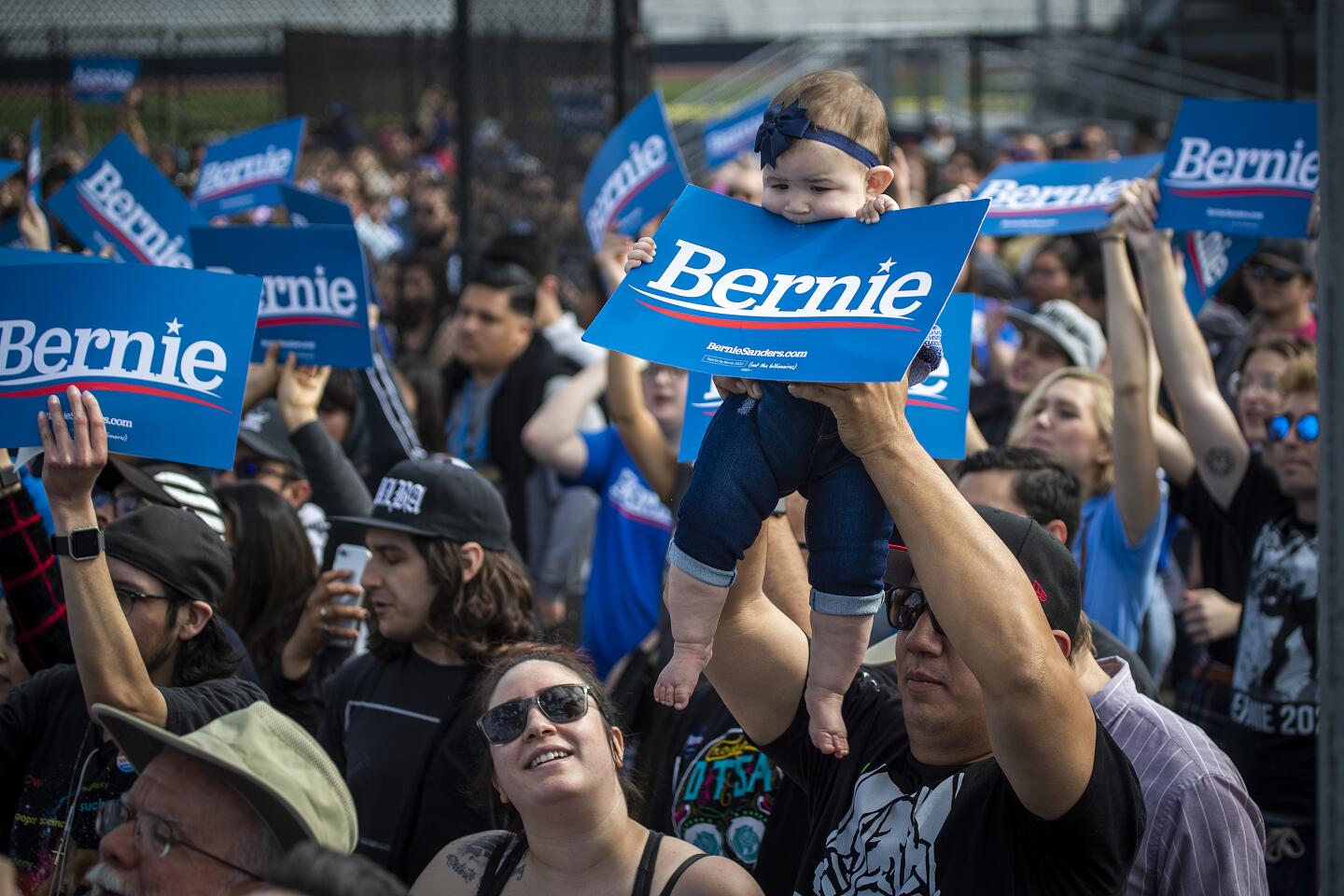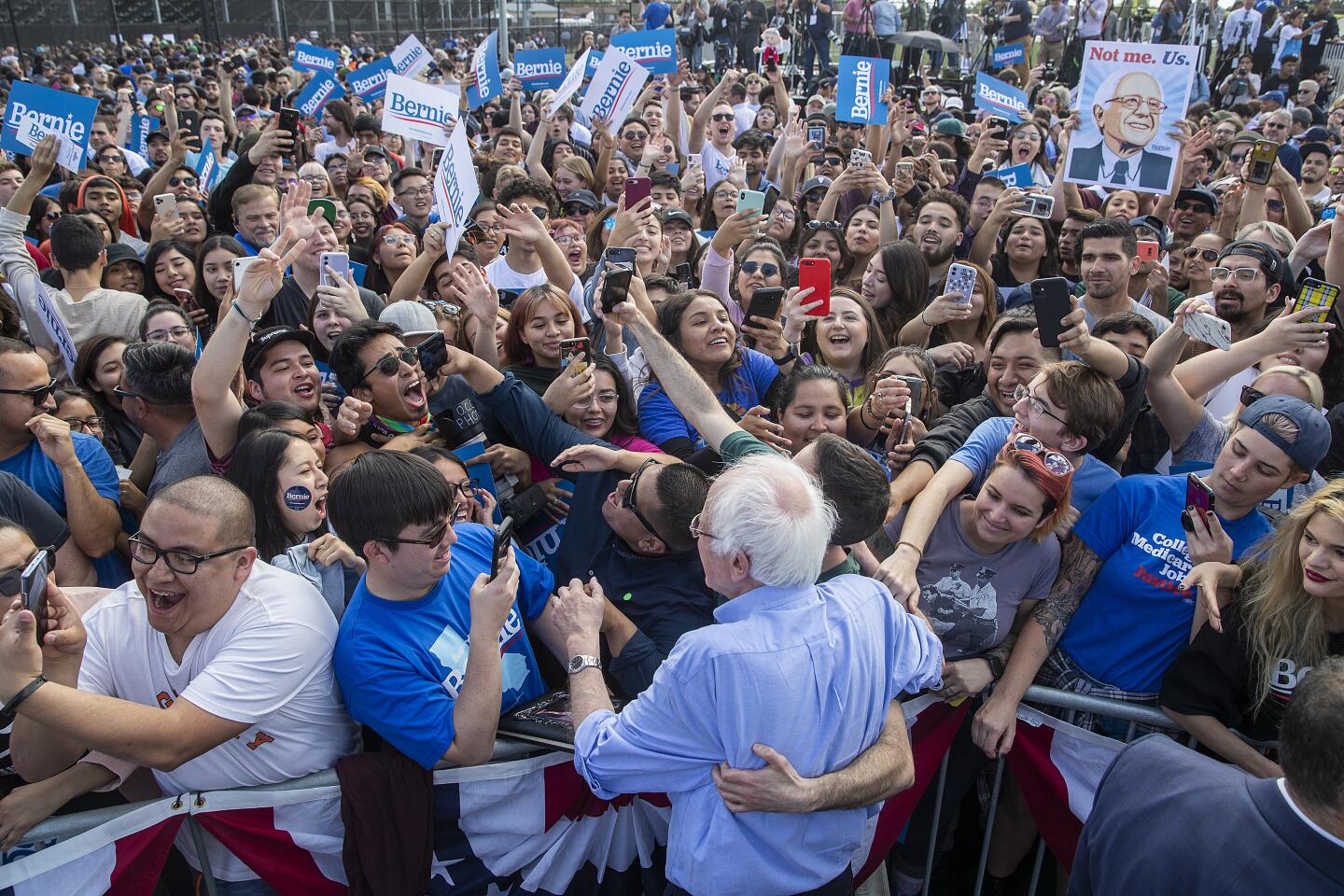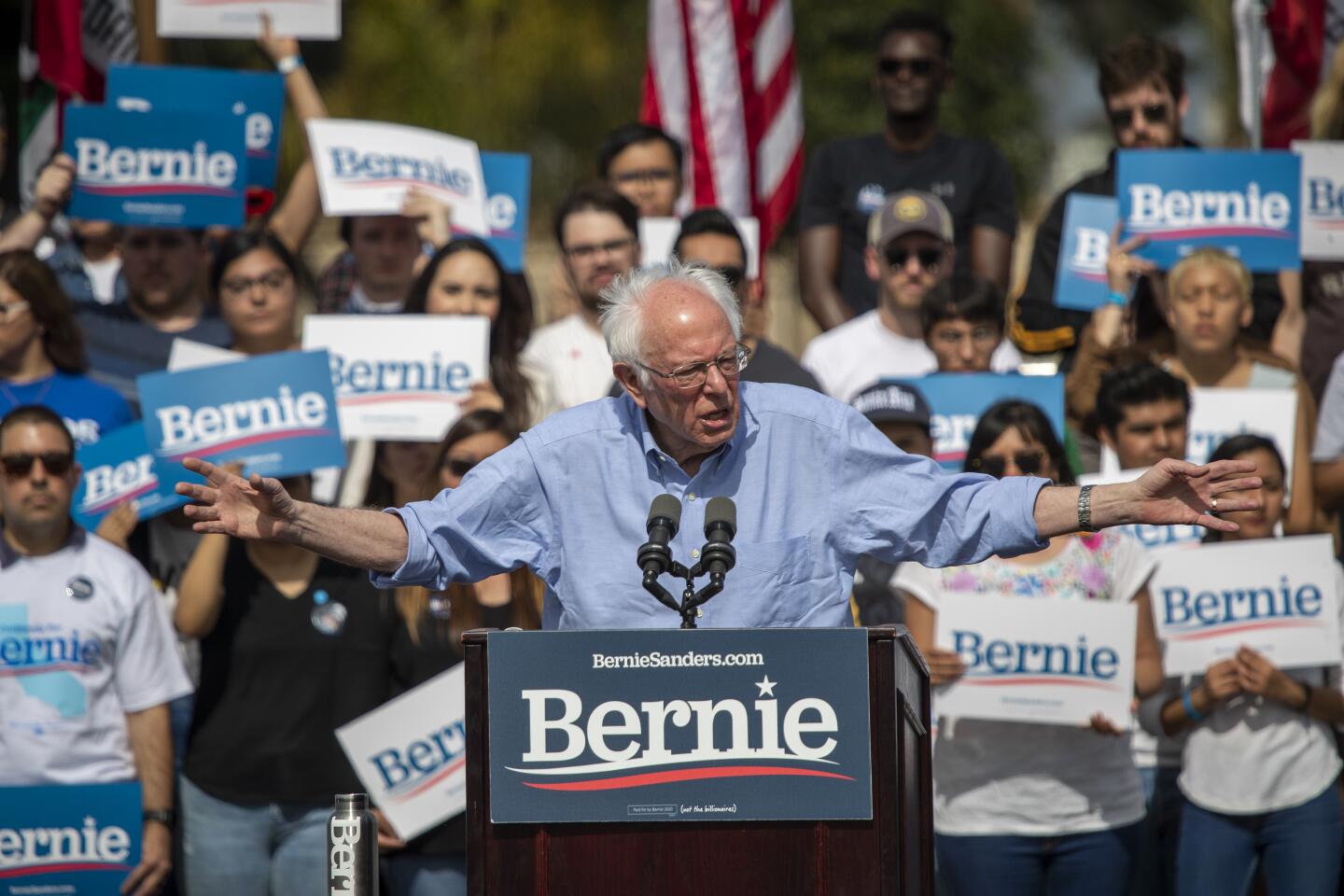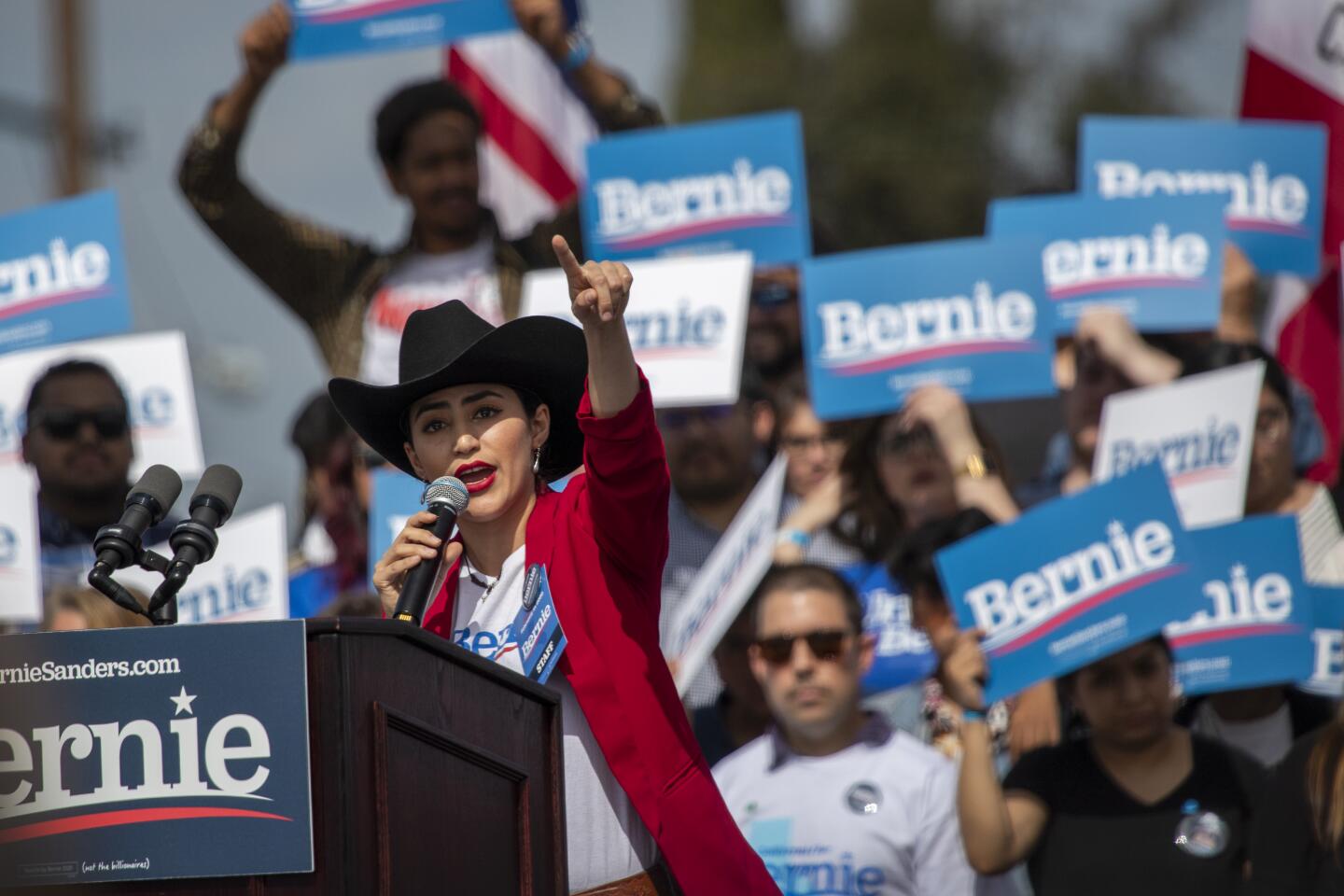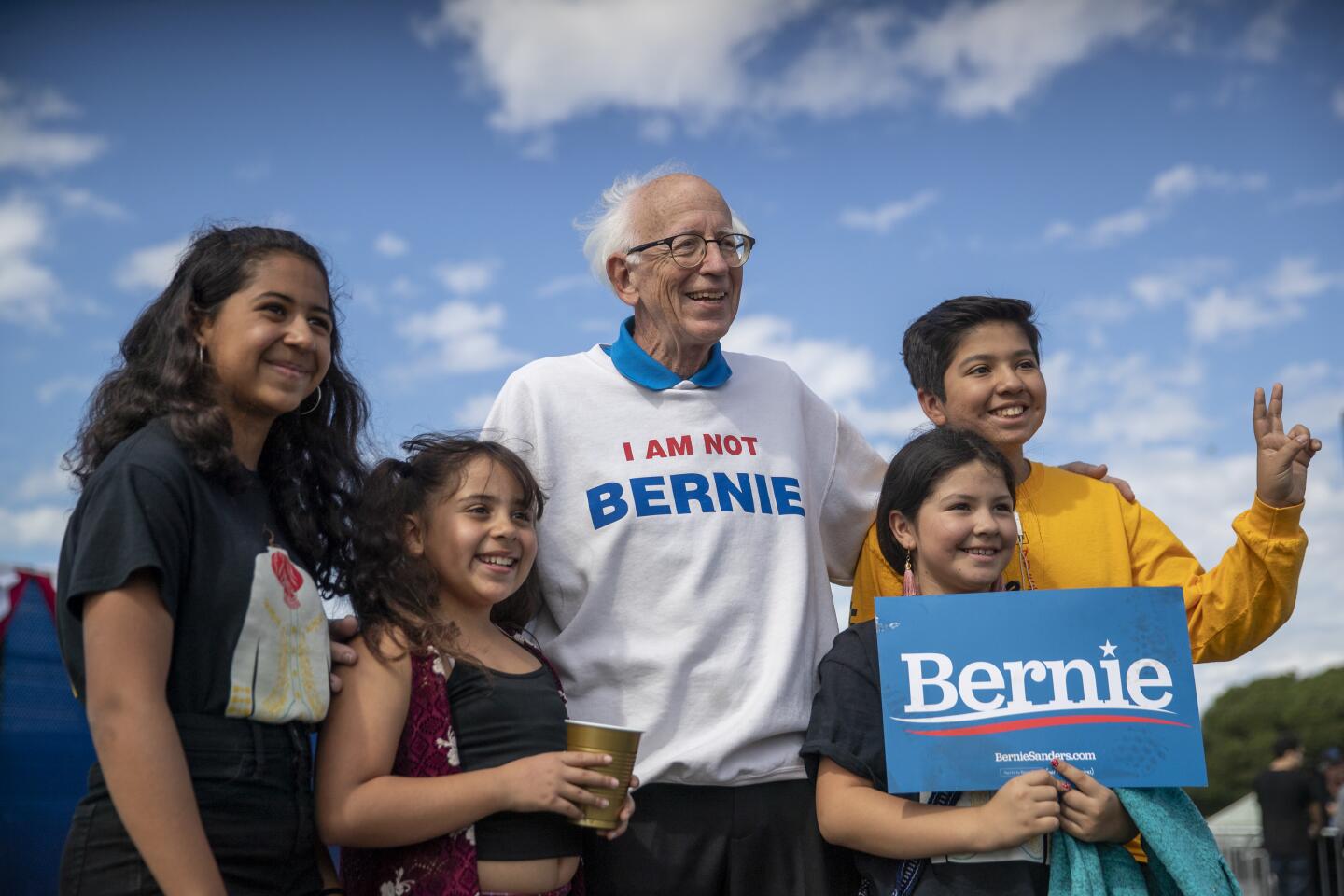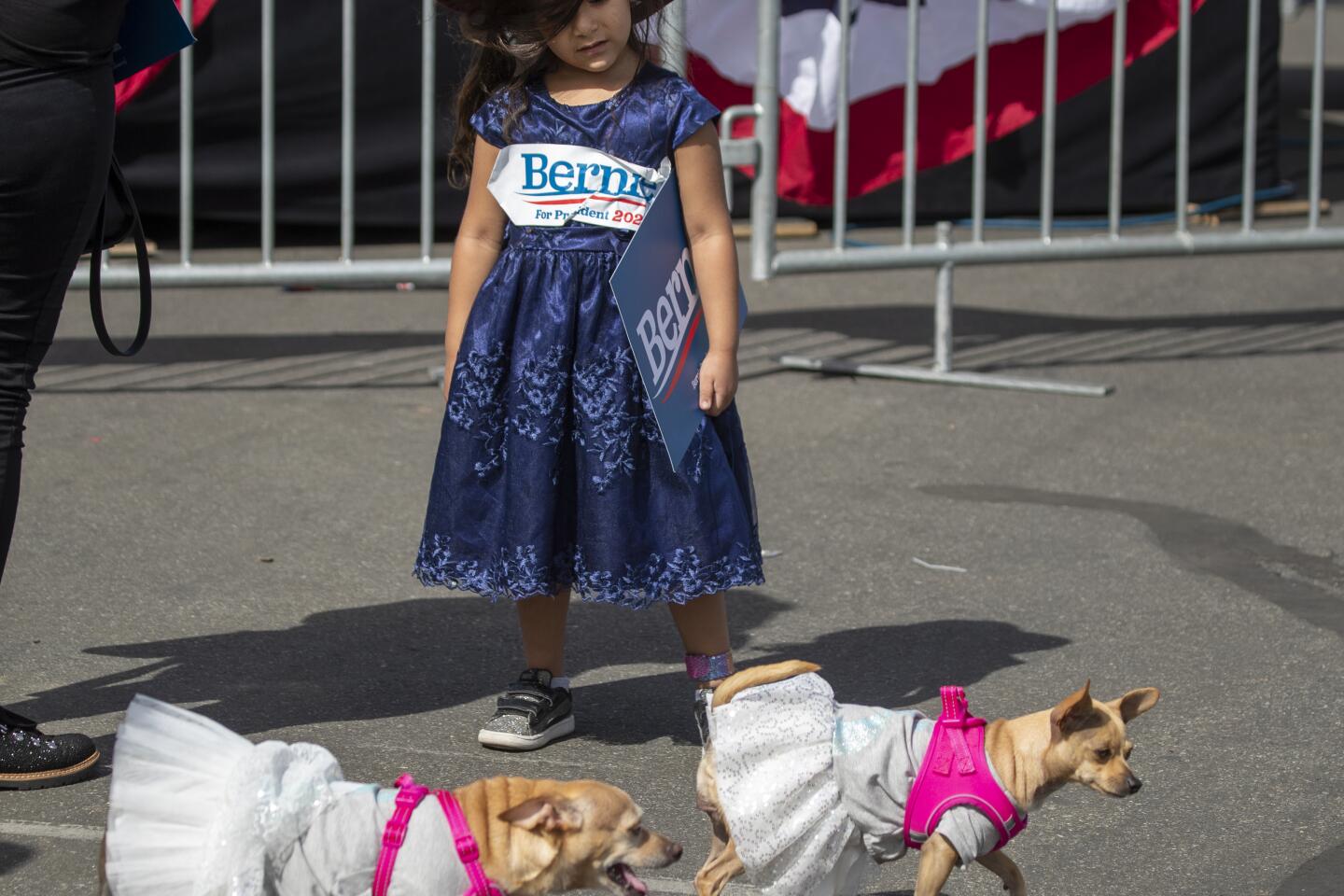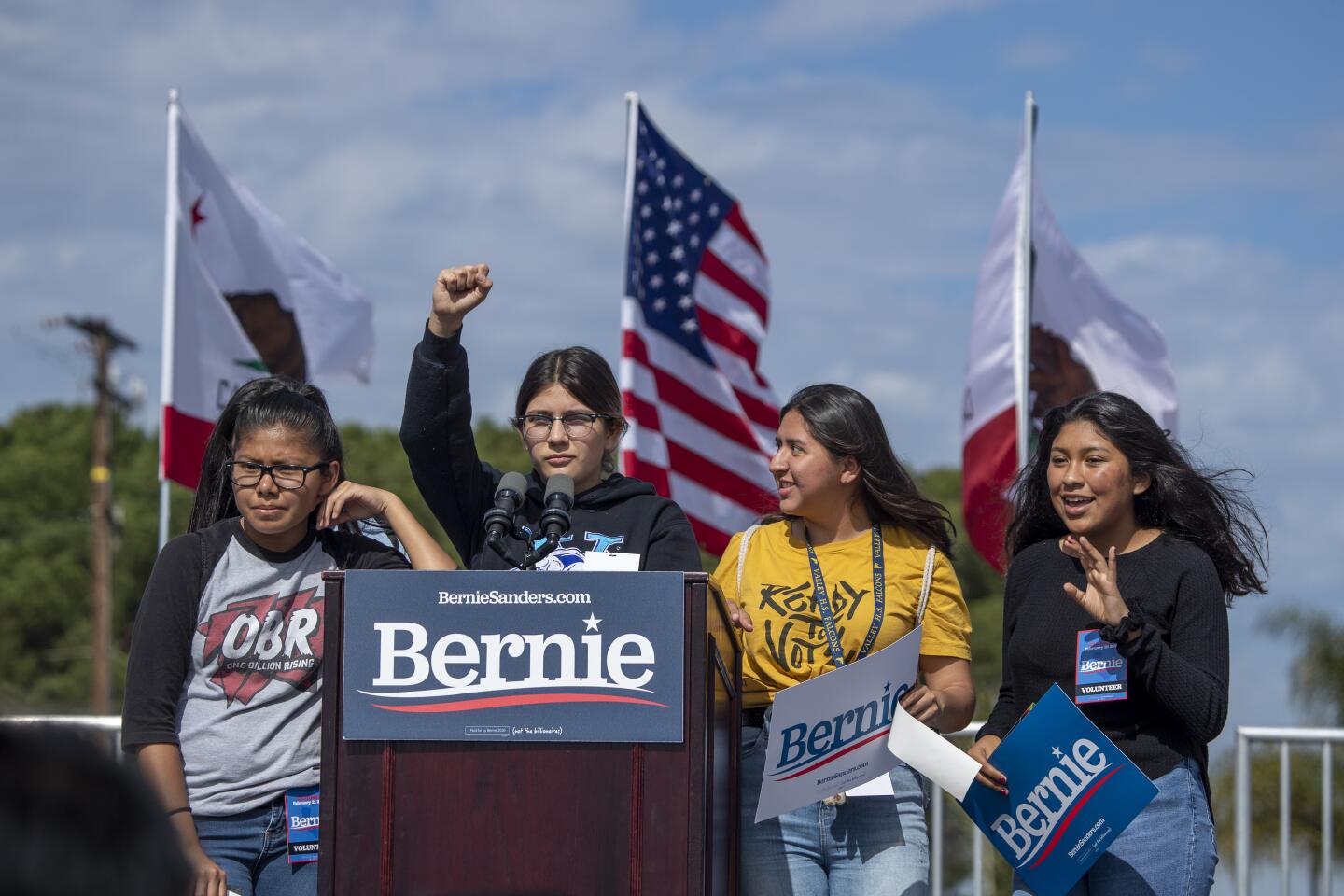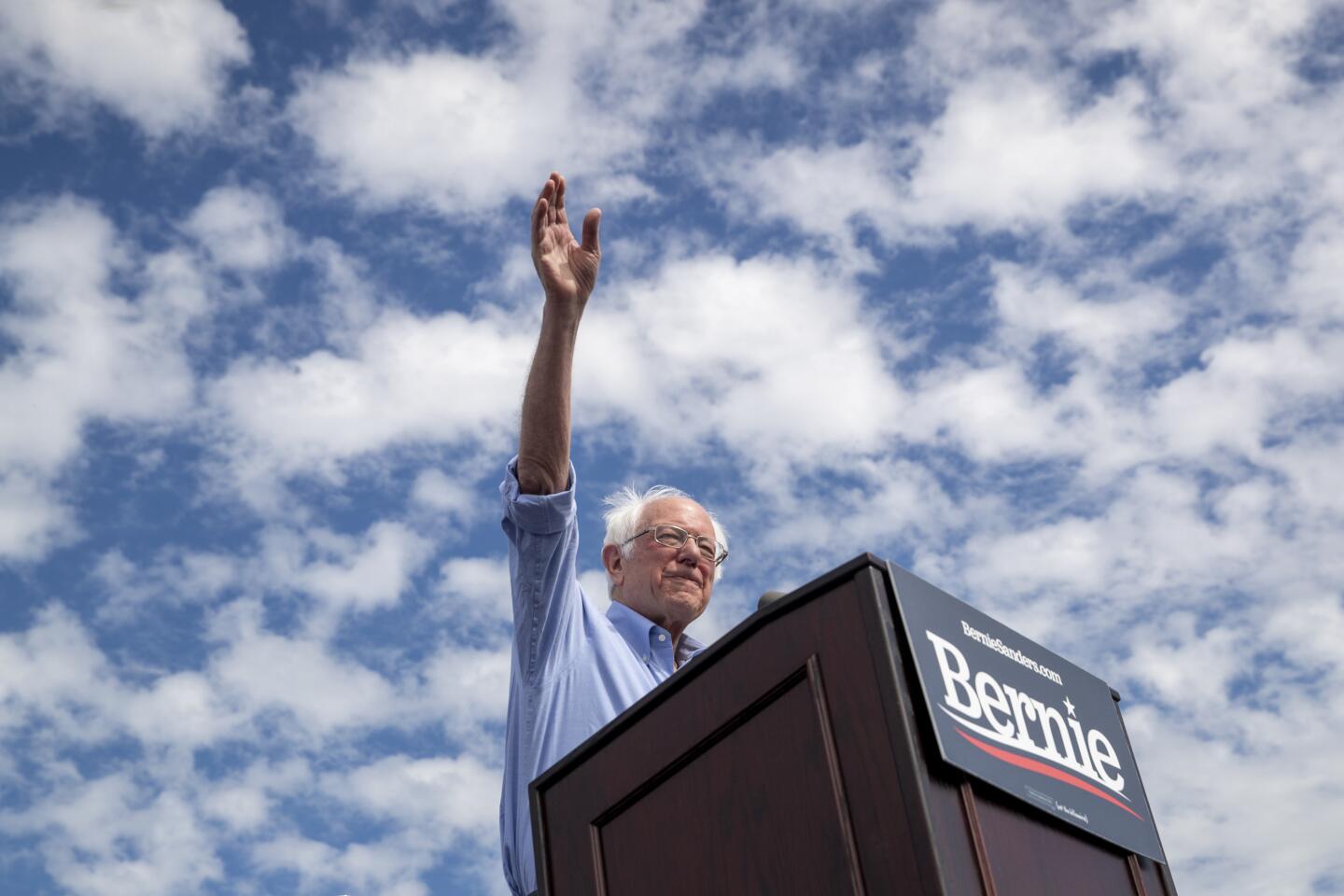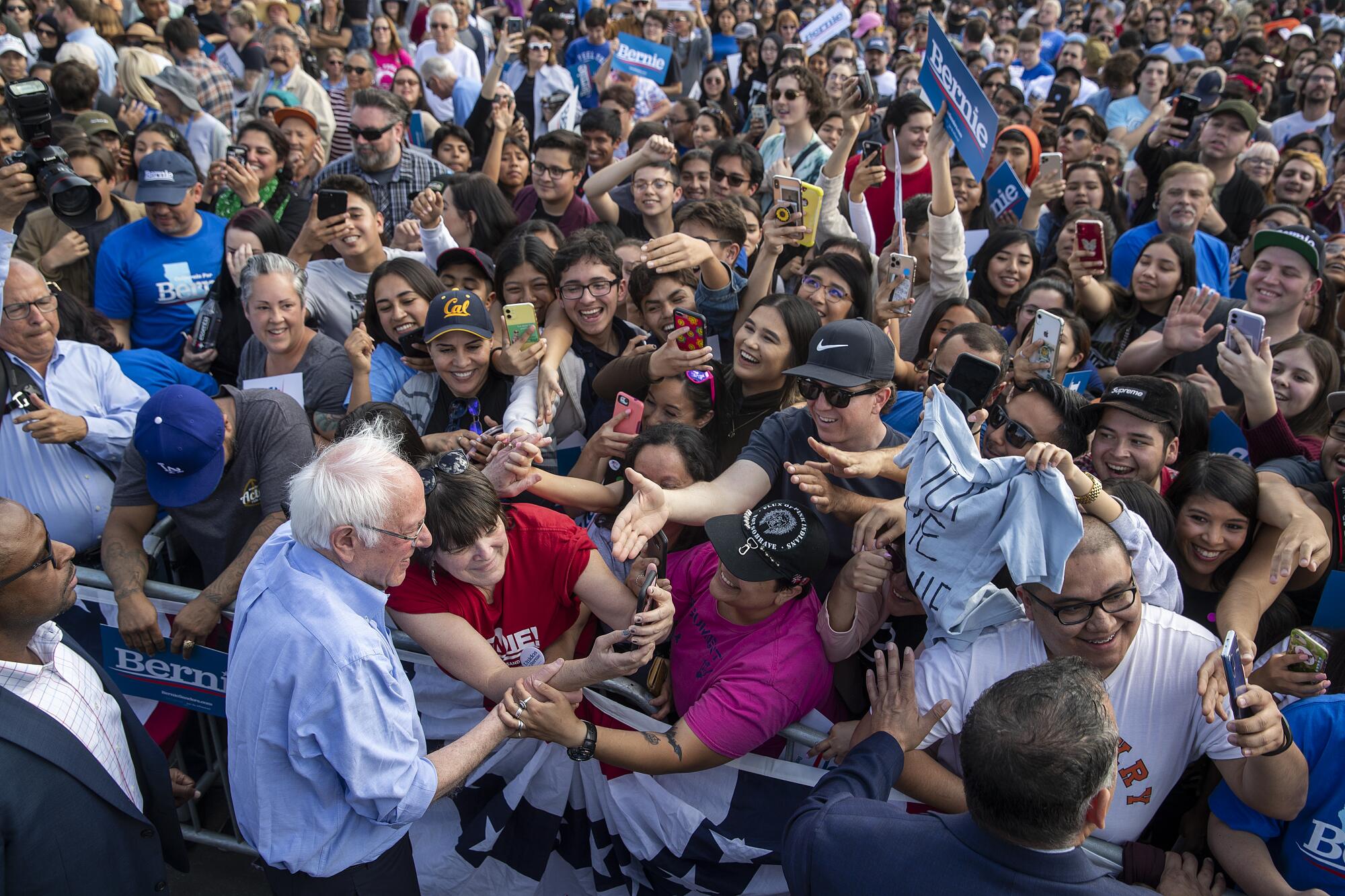
- Share via
They showed up in Stetsons and Dodgers caps. Guayaberas and Mexican blouses. Chicano hipsters — aka “Chipsters” — and punks. Dark, light and all skin tones in between.
It was a rainbow of Latino diversity that streamed onto the Santa Ana Valley High School basketball courts Friday for a Bernie Sanders rally. “Santa Ana ‘Berns’ for you!” shouted one long-haired volunteer, eliding the A’s in the two words so it came out like “SanTana.”
The crowd of more than 4,000 people reflected one of the youngest and most Latino big cities in the United States. Sanders was here to shore up support among voters like them, a demographic he’ll need to win California’s Democratic presidential primary on Super Tuesday, March 3.
A poll released by the Public Policy Institute of California this week shows 53% of Latino voters in California plan to cast their ballot for Sanders — a number far larger than the 32% he picked up among all voters.
But one group of Latinos that Sanders isn’t counting on, so far, to take the Golden State? Big-name politicians.
All the remaining presidential hopefuls have sought the blessings of this generation of California Latino leaders because of their key role in turning the state into a blue bulwark against President Trump. A push from any of them would help raise the profile of commander-in-chief aspirants among Latinos not just in California but beyond.
Yet not a single member of the powerful Latino Legislative Caucus has backed Sanders. Nor has any member of California’s Latino congressional delegation or any statewide elected official.
That incongruity has befuddled lower-level Latino politicians across California — mayors, council members, school board trustees, county supervisors, even water district directors — who have actively campaigned for the Vermont senator.
“It’s interesting — I didn’t know that,” said 21-year-old Kingsburg Councilwoman Jewel Hurtado. She thought about it for a bit, then continued. “It might be a smart, strategic move for them. Or maybe they’re more moderate than they say they are.”
“They [Latino Legislative Caucus members] put special interests ahead of what’s best for Latinx people,” said Walter Muneton, president of the Garden Grove Unified School District board.
Monterey County Supervisor and former Latino Legislative Caucus chair Luis Alejo remembers seeing Eduardo Garcia (D – Coachella), his former colleague in the state Assembly, stump for Tom Steyer on television. “I texted him, and jabbed him a little bit,” Alejo said. “Like, ‘Where is this coming from?’”
He laughed, then sighed. “When folks get to Sacramento, there’s sometimes a disconnect about what the voters are thinking.”
In rapidly urbanizing Nevada, the Democratic caucuses will be the first test of a truly diverse electorate in the presidential nominating contests.
The highest-ranking Latino in California to endorse Sanders is Board of Equalization member Tony Vazquez (an auxiliary member of the Legislative Caucus), who is listed on the Sanders website’s endorsement page.
But what’s happening in California isn’t unique. Only two Latino congressional representatives and seven Latino state legislators have come out for Sanders.
Far from being upset about the upper-echelon snubs, the Sanders camp is taking the development as validation of its Latino strategy: rally the rabble, and eschew the elite.
They’ve opened offices in rural and working-class cities like Oxnard, Visalia, and Fontana with huge Latino populations but with little historical political cachet.
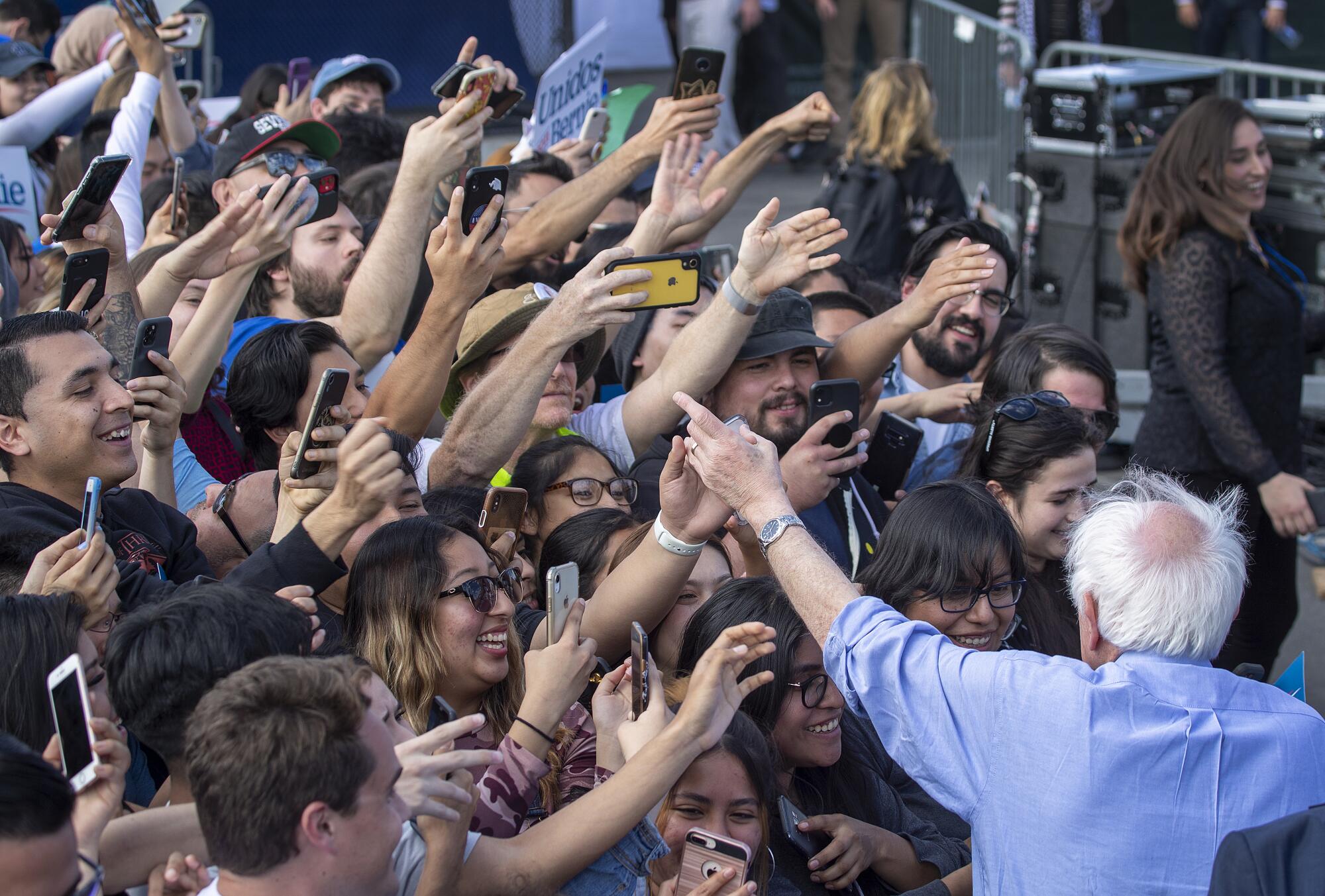
“In most of these areas, people love Bernie,” said the campaign’s California state director, Rafael Návar. “We’re challenging a lot of the establishment politics and the power brokers who are not working-class people — so there’s caution about that from them.”
At rallies across the state, Sanders enlists local Latino politicians to introduce him. They, in turn, offer impassioned speeches about how “Tío Bernie” inspired them to enter politics.
In East Los Angeles in November, it was 26-year-old Cudahy Mayor Elizabeth Alcantar. In Coachella during December, the entire City Council came out to reveal they were unanimously behind him. At Fresno City College, the task fell to Hurtado, who attends the school.
“Bernie understands local issues — that’s where he started,” the city councilwoman said when asked to explain why so many municipal Latino pols are with Sanders. “We are the state who is leading in liberal issues, and it’s hard to see that we don’t have more to see more support on the higher levels. But change comes from the bottom up.”
Political analysts aren’t surprised that Sanders has yet to win over the Latino ruling class.
“The repercussions of endorsing someone who’s outside the Democratic mainstream has ramifications for whether they’ll be included for possibilities” if someone else wins the nomination, said University of Notre Dame political science professor Ricardo Ramírez. “If they do give the endorsement to someone who’s asking, in his own words, for a revolution for politics, then they might be seen as outside the mainstream themselves.”
“In the eyes of this older generation of Latino electeds, he’s portrayed as someone with big ideas but can’t get anything done,” said Christian Arana, policy director for the Latino Community Foundation, a San Francisco nonprofit founded to increase Latino political participation in California. A November poll by the group showed that 38% of Latino voters age 18 to 39 preferred Sanders at the time, while those over the age of 50 preferred Joe Biden.
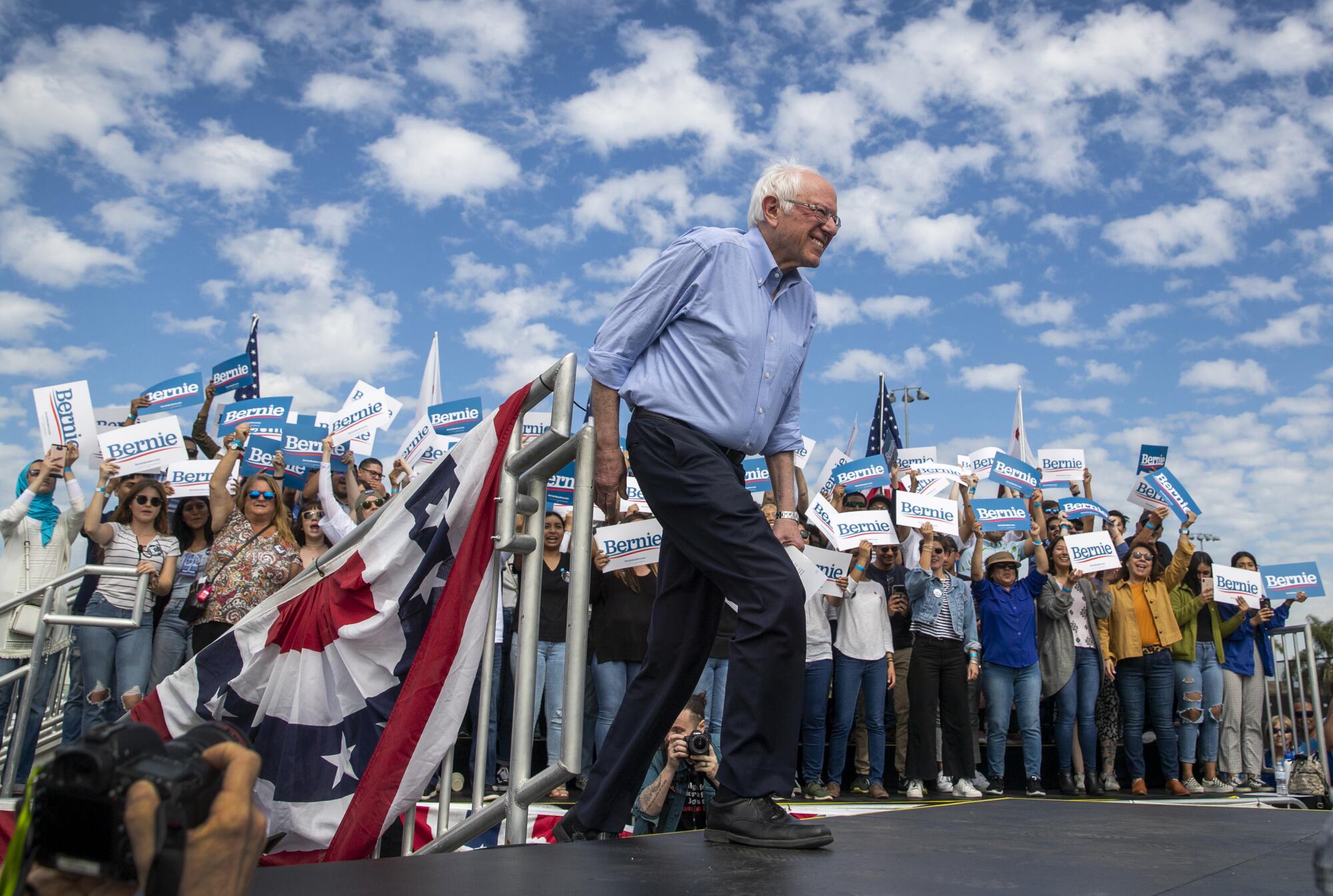
“For younger ones, they don’t have time for the same old same old,” Arana continued. “That’s why they like Bernie. He’s the type of person who’s going to go for it. He just doesn’t care.”
Latino Legislative Caucus chair Lorena Gonzalez (D-San Diego) gets why so many Latinos in her Assembly district and beyond favor Sanders. “Bernie lines up with their values. It makes sense. If [Massachusetts Sen. Elizabeth] Warren weren’t in the race, I’d support Bernie.”
Sanders joined his rivals in courting the caucus last summer and fall across the state in hotel conference rooms and labor offices, at the state Democratic convention and in restaurant basements. The candidates made half-hour pitches and took questions.
Many caucus members initially sided with California Sen. Kamala Harris, who started with strong support. Her dropping out of the presidential race left “a lot of people shell-shocked,” said Gonzalez, and they then went with whom the politicos thought had the best chance of beating Trump.
“We probably, more than our constituents, have a more up-close look at the candidates,” Gonzalez said. “Our access to the information is just at a different level.”
She said Sanders “did a good job” in his interview. One moment, however, stayed with her: Sanders suggested that they should talk with so-called Dreamers, as if he had discovered a new constituency.
“We’re like, ‘Um, they’re our family and friends and constituents,’” Gonzalez said. “He didn’t realize where we live and operate.”
But the Santa Ana rally suggested the Sanders team gets California Latinos more than ever.
The last time Sanders campaigned in Orange County, in 2016, it was at the since-shuttered Irvine Meadows Amphitheatre. This time, it was in Valley High, a school deep in the barrio.
Democratic Party of Orange County chair Ada Briceño drew roars when she called everyone santaneros, the Spanish demonym for Santa Ana residents. Sanders promised “profound changes” to immigration reform but otherwise didn’t make any explicit nods to Latinos.
Not a single Latino politician was onstage.
It didn’t matter to attendees.
“Latino voters don’t care,” said Hairo Cortes, executive director of Santa Ana-based nonprofit Chispa. “Elected Latinos, let’s be real, are just as beholden to corporate interests as other politicians.”
Santa Ana resident Maria Ruvalcaba, 28, who walked to the Sanders event from her home, was more forgiving.
“They’re like our tías, who are, like, ‘Ese viejito, que es no tanto’ [That old man, he ain’t much],” she said. “But they learn once you talk to them about Bernie. They’re not dumb.”
More to Read
Sign up for Essential California
The most important California stories and recommendations in your inbox every morning.
You may occasionally receive promotional content from the Los Angeles Times.
